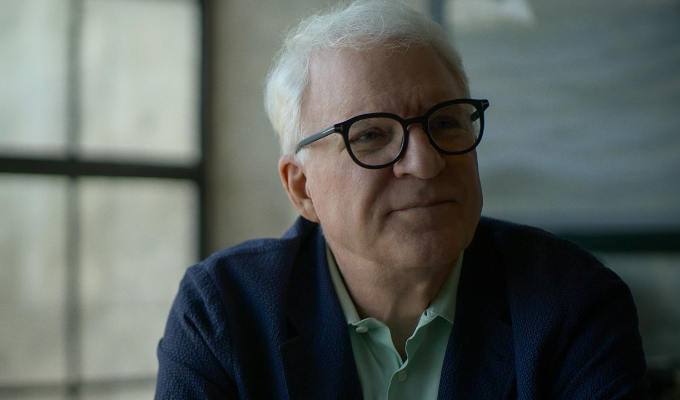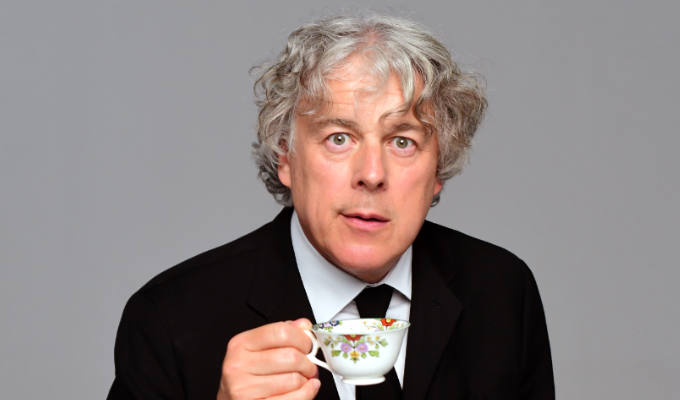 © Apple
© Apple Steve! (Martin): A Documentary In Two Pieces
Review ow the new Apple film about the comic's life and work
Although it’s an unusual decision, it makes sense to tell Steve Martin’s story in two distinct parts – for his life and his career have two separate arcs.
The first is his stand-up career, working his way up from Disney magic store demonstrator to becoming a comedy superstar of unrivalled fame, filling stadiums with his manic goofing around. And just as he slogged his way up to this pinnacle, he quit, feeling creative stagnation, seeing no future goals to hit, and becoming frustrated that, at this scale, his comedy was not what he wanted it to be.
The second is his personal life. In his early life, he was riddled with anxieties and rarely opened up. Now he’s relaxed and content, no longer that aloof enigma. ‘My whole life is backwards,’ Martin offers in the second part of this film – although surely being more comfortable in your skin as you age is far from unusual. ‘I’m nicer, kinder, more open,’ he muses, prompting pal, touring partner, Only Murders In The Building co-star, and this film’s resident pomposity-pricker Martin Short to quip back: ‘Yeah, because for 50 years there you were a real prick.’
But first things first. Part one of Morgan Neville’s documentary, called Then, charts the rise of a man Jerry Seinfeld calls the ‘most idolised comedian ever’ and Saturday Night Live founder Lorne Michaels credits for ‘reinventing stand-up.’
The reason was that he allowed comedy to be silly again after the politically-led stand-up that emerged from the 1960s counter-culture – think George Carlin, Richard Pryor, Mort Sahl.
For all the inventiveness of Martin’s career, this film is a fairly pedestrian biography, chronologically filling in the facts from start to finish. What does stand out, though, is the archive material. Clips of Martin doing his electrifying act evoke happy memories – though younger viewers might be better advised to check out his breakout 1978 Wild And Crazy Guy special in full. More revealing are the early videos of him as a scraggly-haired, bearded youth nicking Jack Benny gags and figuring out what works for him.
Martin is modest about his innate talent but is clearly a craftsman who forensically takes apart his material and delivery. Students of comedy can surely learn something about its mechanics here. Where all the analysis took him was to become a parody of cheesy entertainment, the hapless but enthusiastic jester desperately attempting all manner of undignified tomfoolery to win applause. It was a quintessentially old-fashioned shtick but knowing and ironic enough to appeal to the hip 1970s generation.

His performances and stunts are now legendary, such as tales of him taking his audiences outside the venue, buying them food or continuing the gig in an empty swimming pool. And you can still spot clear echoes of what he was doing half a century ago in many of today’s comics.
Yet behind this, he was racked with insecurities, and his diaries detail panic attacks and thoughts of quitting throughout his career. Until, eventually, he did, when at the top of his game.
Neville tells this story in rather perfunctory archive style, perhaps stymied by the fact Martin related this far much better in his own words in the fabulous 2008 autobiography Born Standing Up.
With an entirely different feel, the second part of Steve! offers a far more personal look at the comic’s life now, at a youthful 78, and how it has evolved since he swapped stand-up for the movies. Such a film would not have been possible a few years ago, so tight a grip did the comic have on what he would release into the public domain.
A telling scene shows an old interview about his passion for art in which he refuses to answer even the gentlest question about the first piece he bought. Hard cut to now when he proudly shows it off.
Another sequence features a string of celebrity pals and colleagues who eagerly line up to pay tribute, Tina Fey and Eric Idle among them. But all say they have little sense of who Martin was as a person, so shy and closed off was he.
Yet here Martin chokes back emotion when he recalls filming Planes, Trains And Automobiles with the late John Candy, and opens up about his strained relationship with his father. That his career was a proxy attempt to win the approval from audiences that he never got from his emotionally distanced dad may be the psychological template of so many comedians, but it’s emotive to see him grapple with this, even if he is still a little cagey about exposing too much of her personal life,
Martin credits much of his more laid-back attitude to life to his second wife, the former New Yorker fact-checker Anne Stringfield, and becoming a father, which happened in 2012 at the age of 67. There’s still a slight melancholy to him, but it no longer overwhelms – he appears fundamentally happy, enjoying his own company and that of friends – never more so than when trading comedy lines with Short.
He also talks about his chequered film career, especially how his first attempt at serious acting in the big-screen version of Dennis Potter’s Pennies From Heaven was a flop, clearly leaving him deflated. In that context, the footage of Paul Kaye in his Dennis Pennis guise asking Martin on the red carpet years later: ‘How come you’re not funny any more?’ seems painfully cruel.
Of this two-parter, Now is by far the better film, though it probably needs Then for context – especially if your knowledge of Martin’s career and his phenomenal success is patchy. After three hours, much of Martin’s life and work still seems unexamined – but anything that keeps his singular talent in the foreground has to be welcome.
• Steve! (Martin): A Documentary in Two Pieces is out now on Apple TV+
Review date: 29 Mar 2024
Reviewed by: Steve Bennett








